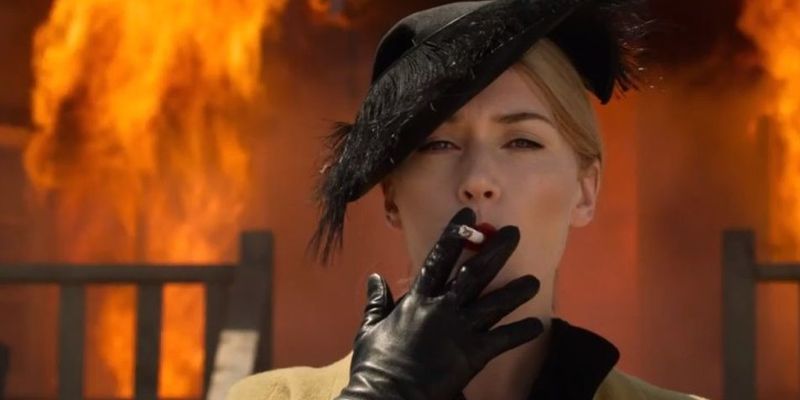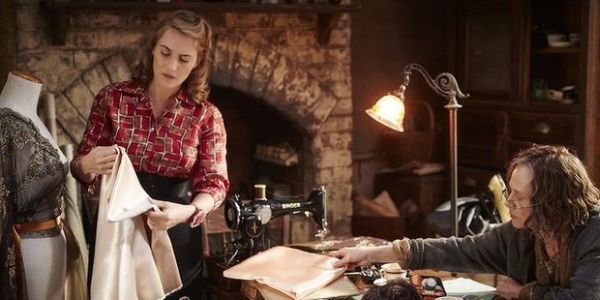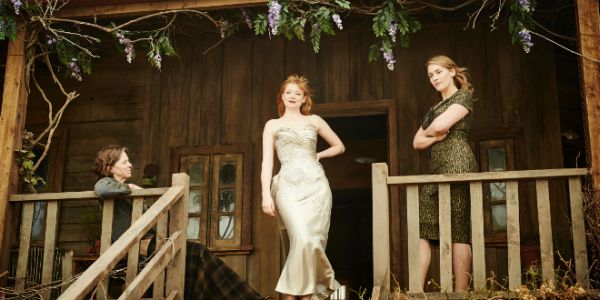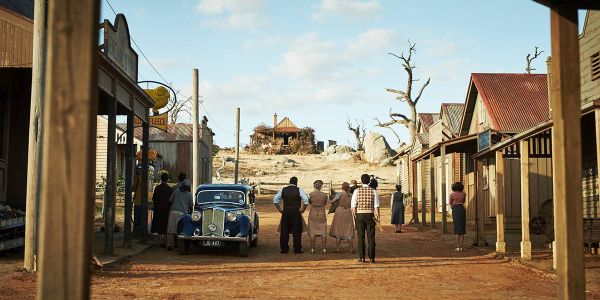THE DRESSMAKER: A Delightful Way To Break Taboos

Manon de Reeper is the founder and CEO of Film…
In The Dressmaker, set in 1950’s Australia, Tilly (Kate Winslet) returns to the small rural town she grew up in, to find closure and to take care of her ill mother, Molly (Judy Davis). When Tilly was ten years old, she was sent away after she supposedly killed a boy – although she cannot remember what happened. She spent twenty years travelling around the world, from Melbourne to London, from London to Italy and Spain, and eventually, Paris, France, where she studied at the great Parisian Couture Houses, and became an expert dressmaker.
The little town of Dungatar reels at her return, the murder of the young boy still fresh on their minds, the townies vindictive. One-by-one, however, Tilly knows to win them over with her great dressmaking skills, and transforms the ugliest women into beautiful, desirable women. One of the women who is not so easily won over hires another dressmaker, and a competition as to who is the best dressmaker commences.
Sounds ridiculous? Yes, it does, and it is. But I’m glad to say it totally works.
Breaking cinematic taboos
Thankfully, the fashion or the murder are not what this movie (based on the book of the same title by Rosalie Ham) is all about. While Winslet, as the femme fatale in red distracting the local men from their footy finals with her unusual beauty, will be a scene I’ll never forget, and the time-appropriate costuming (by Marion Boyce and Margot Wilson) is a sight for sore eyes, it is far from The Dressmaker‘s main focus.
Essentially, the fashion makes for a friendly and accessible disguise for the sensitive and taboo topics the film deals with. One such taboo is the mother-daughter dynamic of Tilly and Molly. Tilly comes back to find Molly in a deteriorated state – she is demented, filthy, and despised by the rest of the town, who refer to her as Mad Molly. Tilly, at one point, has to physically wrangle her mother into a bath, and when she tries to feed her, Molly refuses to eat and tells Tilly she doesn’t even know who she is.

This dynamic evolves beautifully throughout the film as they reconnect and rebond. Unfortunately, not many films allow for a focus on a mother-daughter relationship – especially how challenging these relationships can be. The Dressmaker is an homage to that relationship, and it’s beautiful.
Other taboos that The Dressmaker deals with are domestic violence and marital rape, misogyny, cross-dressing, even the use of medical cannabis by the elderly. All are topics rarely broached in film, and I commend director Jocelyn Moorhouse for portraying them subtly and carefully. What especially caught me off-guard though, perhaps due to having gone through it recently myself, was the portrayal of the final washing of a passed loved one. Lovingly caring for the dead is not often portrayed in film and its portrayal was sweet, realistic and to the point. While the scene is short, it’s long enough to leave a long-lasting impression.
This is not a heavy-handed drama – to the contrary
Now, don’t think this is a heavy-handed drama. The Dressmaker, despite making such astute observations about the daily challenges of women, is incredibly comical. In fact, it’s one of the funniest movies I’ve seen in a very long time – and it’s mostly thanks to Judy Davis’ Molly. Davis single-handedly lifts The Dressmaker from slightly funny to simply hilarious. She never withholds her sharp tongue, which makes for a few excellent one-liners. The scene where Tilly, Teddy (Liam Hemsworth) and she visit the cinema to see Sunset Boulevard is particularly memorable.

One of the biggest surprises of the film, perhaps, is Hugo Weaving. I won’t spoil too much, but his police officer character is one of the most flamboyant lawmen I’ve ever seen, and he is perfectly hilarious. Weaving played in another small Australian production last year (here), and I love that he frequently takes the time to support these smaller projects despite all the big Hollywood franchises he’s attached to.
Winslet returns to top form with this film – her performance as Tilly is deep and poignant, and altogether different from her shallow and over-the-top villainous Janine in the Divergent movies. It reminds you of why she won that Best Actress Oscar in 2009. She’s taken on quite a few odd projects since her Oscar win, and is a hard one to pin down; she’s never predictable.
Wonderfully complex
In the creation of this film, no element has been ignored. Every costume and hair-do was put careful thought into. The person I went to see the movie with was even convinced that every hair-do said something about the woman and her transformation, which I’m inclined to agree with, especially if you consider the ‘do of the town villain, Beulah (Kerry Fox).
The sets are stunning – the old, Australian town feels authentic, and much attention has been paid to the buildings and props. The diegetic sounds of birds and environment are true – if you’ve been to Australia you might even be able to imagine the smell. The music is on-point for the time period and plays an integral part in the film – at a certain point, Tilly plays a record of Billie Holiday, and Molly, not used to blues, says she “sounds like she could use one”.

The Dressmaker features a large cast. Frequently in feature films, secondary characters are often underdeveloped. Thankfully, that’s not the case here. While a little stereotypical and hyperbolic for comedic effect, each character is well-rounded and their motivations are fully fleshed out, largely thanks to careful foreshadowing.
If it sounds like a lot is happening in this movie, you’re right. The story is swiftly paced, riddled with subplots, and according to The Guardian, it’s a “tonally uneven, genre-shifting hurricane of a thing […].” I agree it’s a hurricane. It’s not a straightforward mystery or a straightforward comedy, nor is it a simple drama – and there’s even some romance, too. It’s a mishmash of genres. However, you never lose track of what happens, and the way the main characters respond to events feels true. The Dressmaker is wonderfully complex, there is never a dull moment.
To conclude
The Dressmaker portrays the challenges of life that are presented to – in particular – women throughout the world, every day. While The Dressmaker‘s veneer is glossy and fashionable, the underlying messages are gritty and meaningful. In a way, The Dressmaker reminds of Lars Von Trier‘s Dogville, though it’s infinitely more accessible, and less depressing, but the way in which it portrays the hardships of women in small rural towns is similar.
The Dressmaker is hilarious, touching, it’s visually pleasing, it’s well-written and has interesting characters, in particular the female ones, who are in control throughout the story. Although The Hollywood Reporter said it “is about as far from essential viewing as one could imagine,” I daresay that if you want to watch a movie that attempts to break taboos (without punching you in the face with it), is a ton of fun, and if you enjoy a woman’s story told from a woman’s point of view, it certainly is essential viewing – even for men.
What’s your impression of The Dressmaker, is it a movie you’d be interested in seeing at first glance?
The Dressmaker is currently being screened in theatres around Australia. It will get a wide release in the U.K. on November 20, 2015. The exact release date in the U.S. has yet to be set. For other international release dates, check here.
(top image source: Universal Pictures)
Does content like this matter to you?
Become a Member and support film journalism. Unlock access to all of Film Inquiry`s great articles. Join a community of like-minded readers who are passionate about cinema - get access to our private members Network, give back to independent filmmakers, and more.
Manon de Reeper is the founder and CEO of Film Inquiry, and a screenwriter/producer. Her directorial debut, a horror short film, is forthcoming in 2021.











